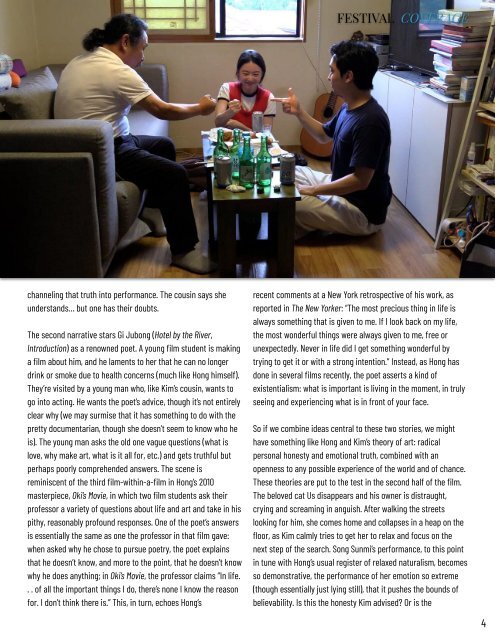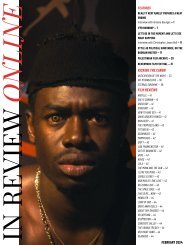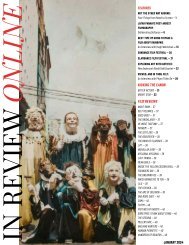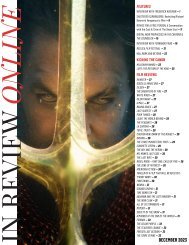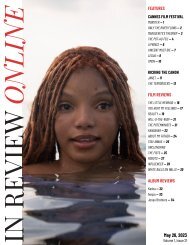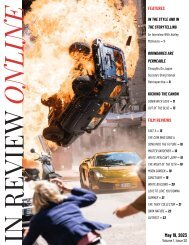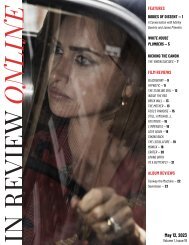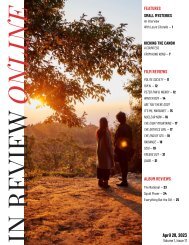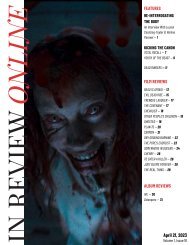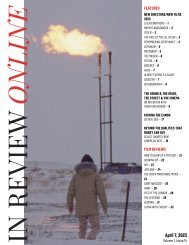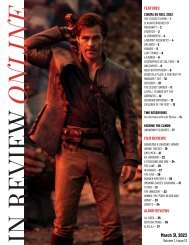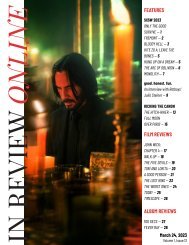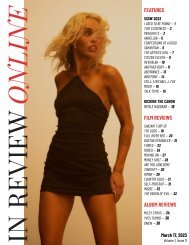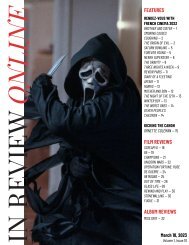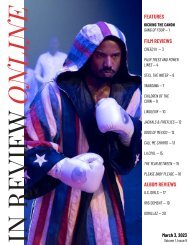You also want an ePaper? Increase the reach of your titles
YUMPU automatically turns print PDFs into web optimized ePapers that Google loves.
FESTIVAL COVERAGE<br />
channeling that truth into performance. The cousin says she<br />
understands… but one has their doubts.<br />
The second narrative stars Gi Jubong (Hotel by the River,<br />
Introduction) as a renowned poet. A young film student is making<br />
a film about him, and he laments to her that he can no longer<br />
drink or smoke due to health concerns (much like Hong himself).<br />
They’re visited by a young man who, like Kim’s cousin, wants to<br />
go into acting. He wants the poet’s advice, though it’s not entirely<br />
clear why (we may surmise that it has something to do with the<br />
pretty documentarian, though she doesn’t seem to know who he<br />
is). The young man asks the old one vague questions (what is<br />
love, why make art, what is it all for, etc.) and gets truthful but<br />
perhaps poorly comprehended answers. The scene is<br />
reminiscent of the third film-within-a-film in Hong’s 2010<br />
masterpiece, Oki’s Movie, in which two film students ask their<br />
professor a variety of questions about life and art and take in his<br />
pithy, reasonably profound responses. One of the poet’s answers<br />
is essentially the same as one the professor in that film gave:<br />
when asked why he chose to pursue poetry, the poet explains<br />
that he doesn’t know, and more to the point, that he doesn’t know<br />
why he does anything; in Oki’s Movie, the professor claims “In life.<br />
. . of all the important things I do, there’s none I know the reason<br />
for. I don’t think there is.” This, in turn, echoes Hong’s<br />
recent comments at a New York retrospective of his work, as<br />
reported in The New Yorker: “The most precious thing in life is<br />
always something that is given to me. If I look back on my life,<br />
the most wonderful things were always given to me, free or<br />
unexpectedly. Never in life did I get something wonderful by<br />
trying to get it or with a strong intention.” Instead, as Hong has<br />
done in several films recently, the poet asserts a kind of<br />
existentialism: what is important is living in the moment, in truly<br />
seeing and experiencing what is in front of your face.<br />
So if we combine ideas central to these two stories, we might<br />
have something like Hong and Kim’s theory of art: radical<br />
personal honesty and emotional truth, combined with an<br />
openness to any possible experience of the world and of chance.<br />
These theories are put to the test in the second half of the film.<br />
The beloved cat Us disappears and his owner is distraught,<br />
crying and screaming in anguish. After walking the streets<br />
looking for him, she comes home and collapses in a heap on the<br />
floor, as Kim calmly tries to get her to relax and focus on the<br />
next step of the search. Song Sunmi’s performance, to this point<br />
in tune with Hong’s usual register of relaxed naturalism, becomes<br />
so demonstrative, the performance of her emotion so extreme<br />
(though essentially just lying still), that it pushes the bounds of<br />
believability. Is this the honesty Kim advised? Or is the<br />
4


